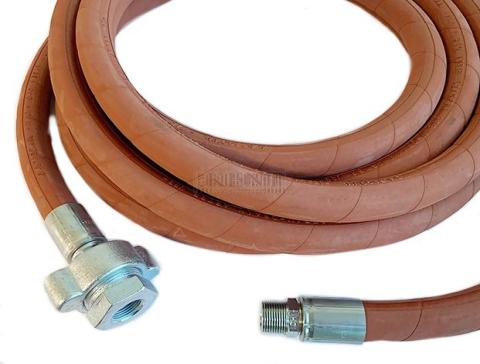In the oil and gas industry, API 7K series high-pressure cement hoses are key equipment for transporting high-pressure fluids. It is designed and manufactured to the strict specifications of the American Petroleum Institute (API) to ensure reliability and durability in harsh environments. However, for businesses, investing in such high-specification hoses must not only consider their performance, but also evaluate their economic impact. This article will use cost-benefit analysis to discuss the economic impact of investing in API 7K series high-pressure cement hoses, including initial investment, operation and maintenance costs, and potential risk costs.
1. Initial investment considerations
Initial investment is the first factor that companies need to consider when purchasing API 7K series high-pressure cement hoses:
Purchase cost: API 7K series high-pressure cement hoses are usually more expensive than ordinary hoses due to their high standard manufacturing requirements. This requires enterprises to make trade-offs based on budget and needs.
Accessories and installation costs: In addition to the hose itself, you also need to consider the purchase cost of accessories such as connectors and elbows, as well as additional costs that may be incurred during the installation process.
Expected service life: Although the initial investment is higher, the long-life design of API 7K series high-pressure cement hose can reduce the frequency of long-term replacement, thus offsetting the high purchase cost to some extent.
2. Operation and maintenance cost analysis
Operation and maintenance costs are an important factor affecting the overall economics of API 7K series high-pressure cement hoses:
Maintenance costs: Although API 7K series high-pressure cement hoses have good durability, they still require regular inspections and necessary repairs to maintain optimal working condition.
Energy costs: An efficient conveying system can reduce energy losses and reduce energy costs when pumping fluids.
Downtime costs: Due to the reliability of API 7K series high-pressure cement hoses, downtime due to failures can be significantly reduced, thereby saving potential economic losses caused by downtime.
3. Risk cost and safety performance
When considering investing in API 7K series high-pressure cement hoses, it is important to evaluate not only the direct economic costs, but also the potential risk costs:
Accident risk cost: Due to its excellent safety performance, using API 7K series high-pressure cement hose can reduce the risk of accidental leakage or rupture, reducing possible environmental pollution and personal injuries.
Business Continuity: Reliable hose systems help keep your business running and avoid production delays and related financial losses due to breakdowns or accidents.
Insurance and Compliance Costs: Equipment that meets API standards often results in lower insurance costs and ensures compliance with various environmental and safety regulations.
In summary, although investing in API 7K series high-pressure cement hoses will face higher initial costs, in the long run, its reliability, durability and safety can bring significant economic benefits to the enterprise. By comprehensively considering initial investment, operation and maintenance costs, and potential risk costs, companies can make more informed investment decisions and maximize cost-effectiveness. When choosing the right products and suppliers, it is recommended that companies conduct comprehensive market research, compare the cost-effectiveness of different options, and choose high-quality products that best suit their needs.

